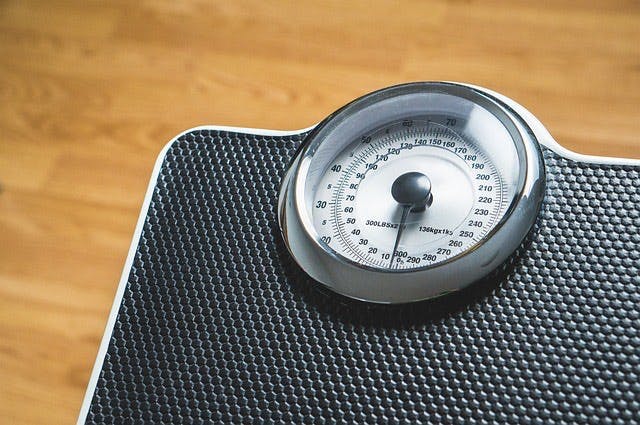
As part of Eating Disorders Awareness Week, we ask if free weight loss club programmes for young people are right or healthy?
Since Weight Watchers announced plans to introduce free slimming classes this summer for 13-17 year olds, many counsellors, nutritionists and social media influencers have been actively criticising the upcoming programme using the hashtag #wakeupweightwatchers
However, Weight Watchers isn’t the only organisation to offer teens free weight loss plans. Slimming World has been offering its Free2Go programme for 11-15 year olds since 2006. The website currently notes "Slimming World is the first and only weight loss organisation to offer real, practical help to children."
Happiful asked both Slimming World and Weight Watchers for more information around these initiatives in the wake of wide-ranging criticism around the promotion of restrictive eating and dieting at a young age. We also spoke with Nutritionist Kate Fitzpatrick and heard from Counsellor Lynn Moore about the issues free slimming plans for young people could pose.
Slimming World
Slimming World notes on their website that their Free2Go programme for 11-15 year olds helps over 10,000 young members every year, with their families, to live healthier lives. They responded to Happiful: "Slimming World developed a Free2Go eating plan, based on Food Optimising, specifically for young people to encourage unlimited enjoyment of fruit, vegetables and other low energy dense, satiating foods such as lean meats, poultry, fish, pasta, potatoes and rice, while gradually reducing intake of more energy dense, fatty and sugary foods. The emphasis is on healthy eating and increased physical activity, rather than weight loss."
Further to this, Slimming World consultants inform a child’s GP that their patient is attending Slimming World and invite them to get in touch with the weight loss club if they would like more information. Slimming World consultants will not suggest weight changes or target weights for 11-15 year olds although they do have age-specific BMI centile charts from the Child Growth Foundation that show healthy BMIs for young people and monitor them frequently along with their parent/guardian.
Nutritionist Kate Fitzpatrick commented on the Slimming World approach “It is clear for all to see on the Slimming World website that “fat-free” products such as cheese and yogurts are encouraged along with diet soda drinks. Most nutrition is lost in these products, replaced with artificial flavours, artificial sweeteners and E numbers, all of which have been proven to have an effect on the brain. Young and still developing brains absolutely need “good” fats and absolutely not flavour enhancers of any kind, as these may change the way in which an individual’s brain functions - and may lead to serious health conditions as well as disrupting blood sugar levels as artificial sweeteners are taken up in the body in exactly the same way as sugar - therefore not only imbalancing blood sugar levels but also promoting sugar cravings.”

She continued “Added to which, research has shown that drinking zero or non zero soda drinks can leach calcium out of the bones into the blood when spongy, cancellous bone (epiphysis) is still developing at secondary ossification sites and growth plates are promoting longitudinal growth until young adulthood. How can these products be advertised as being healthy?”
Weight Watchers
Weight Watchers International outlined their plan for Happiful "Our goal is to help those who need healthy habits to develop them at this critical life-stage; this is not about dieting. This summer, teens will be able to join Weight Watchers for free and can continue their membership through to the age of 17. They will be required to go to one of our meeting locations for their parent/guardian to provide consent, as we know a family-based approach is critical at this age. We have and will continue to talk with healthcare professionals about specific criteria and guidelines as we get ready to launch this program. We think there’s a real opportunity to make an impact on a problem that is not currently being addressed effectively."
Weight Watchers also noted that as well as being accompanied by a parent or guardian teens must have written approval by their doctor and their target weight must be set by and reviewed by their doctor every six to nine months, to make sure they are not losing weight too quickly. The teen must be at or above the 95th percentile for their age and gender. Finally, the SmartPoints budget that will be set, will be age appropriate to ensure healthy weight management.
Kate responded to this “Weightwatchers do insist on asking for a GP’s consent for 13-17 year olds to join, but if a check-up with their GP is required 6-9 months on, a lot of damage can be caused in the interim months, including dramatic weight loss, obsession about food notably by having to build meals around a point system which does not teach children the basics of a nutritionally dense diet using simple local fresh produce which would lead to a healthy eating regime and weight management.”
Dangerous Messaging
While both Slimming World and Weight Watchers insist that the emphasis of their teen plans is upon healthy eating rather than weight loss, some of the language around the plans can be seen as less than positive. The use of the word ‘Syn’ by Slimming World to represent food that isn’t as healthy as other ‘free foods’ paints picture of good versus bad or sinful ('the Syn system is designed to take the guilt right out of eating’). Although Slimming World does not ask young people to count Syns, it is the method widely discussed in meetings.
On the subject of free diet plans, Counselling Directory Member, Lynn Moore, of Food for Thought Counselling wrote “Why, when it is widely reported that teenagers are one of the most vulnerable age groups to potentially develop disordered eating habits, are Weight Watchers encouraging this group of people to embark on dieting behaviours for free? It would be refreshing to see counselling for teenagers being offered and promoted more too, so that their mental wellbeing is being addressed alongside the eating behaviours, as, in my experience, an unhealthy relationship with food is often not about the food, but about the underlying psychological issues which are driving the disordered eating behaviours.”
Lynn continued “Therefore, I am appalled that this susceptible, vulnerable teenage age group are being targeted with the invite of ‘free slimming sessions’ which could potentially start them on the slippery slope of becoming ‘dieting fixated’, possibly for life, when they are at that impressionable age where they are developing both physically and mentally into young adults.”
Kate tells us that Nutritionists are seeing more (predominantly) girls although boys as well between the ages of 11-15 and older with eating disorders, many being referred by psychologists. She says “These young people have generally spent from one to three years (or longer with an older child) with an eating disorder. It has been brought on from other mental and emotional issues from early life traumas, bullying at school or simply wanting to appear like others perceived as being more “beautiful” than themselves such as pop stars, models and other celebrities. Choosing to restrict one’s diet can give the feeling of being able to control one area of life, sometimes subconsciously, whilst everything else is in chaos either internally or externally.”
Kate notes that adolescents are going through huge hormonal, physical, emotional and mental changes and, if they are not guided and mentored, whether at home or school, they may turn to outside influences - including the array of advertisements on how to “lose weight, look great and be more confident”. In her opinion, fad diets or weight controlling plans such as Weight Watchers and Slimming World are not the answer and can lead to years of misery and mental health issues as well as long-term health conditions.
Concern has also been expressed by a number of social media influencers.
Hope Virgo, mental health advocate and author of Stand Tall Little Girl, wrote "The number of people with #eatingdisorders is increasing and we have to be so careful of all the messaging young people get"
Like seriously @WeightWatchers this is so dangerous! The number of people with #eatingdisorders is increasing and we have to be so careful of all the messaging young people get #wakeupweightwatchers https://t.co/D0cm9fYxqP
— Hope Virgo (@HopeVirgo) 17 February 2018
Body positivity advocate and author Megan Jayne Crabbe tweeted "Your body is not a problem. You do not have to spend your summer counting and weighing instead of growing and living."
Dear teenagers,
— Megan 🐼 (@bodyposipanda_) 13 February 2018
Your body is not a problem. You do not have to spend your summer counting and weighing instead of growing and living. Go collect memories, not points.#WakeUpWeightWatchers
Dietician, Nutritionist and Social Worker Lisa Ellis followed with "Putting kids on diet roller-coaster (even for free) sets up yo-yo diets, shame spiral, binge-eating, ongoing problems & few dieters maintain goals post-diet!"
Too many kids have food issues
— Lisa Ellis (@LisaTheRD) February 16, 2018
Putting kids on diet roller-coaster (even for free) sets up yo-yo diets, shame spiral, binge-eating, ongoing problems & few dieters maintain goals post-diet!
Deprivation & dieting mentality is NOT the answer!#WakeUpWeightWatchers #DoneWithDieting
Kate Fitzpatrick sums up the concerns expressed “Although more information is being provided to a wider public audience on the benefits of healthy eating, including regular exercise for adolescents, a lot more still needs to be done to avoid the current stigma of not being the “perfect weight” or having the “perfect look” and organisations such as Weight Watchers and Slimming World are simply “feeding” adolescents the wrong information.”
Visit Nutritionist Resource for support and information
Find a local Counsellor on Counselling Directory.

